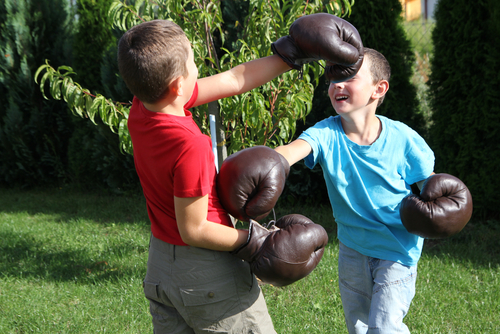|
Preventing Sibling Rivalry
Many parents with more than one child can share these facts about their kids: “They fight terribly . . .They will play happily for ten minutes and then the fighting begins again.” Sound familiar? Kids fight for many reasons. Just like everything else in childhood, the underlying reason kids fight is that they need to learn something.
Brothers and sisters teach each other about give and take, even when they don’t want to. They’re practicing how to love a person, even when they don’t like what that person did. Siblings are constantly learning tolerance, patience, kindness, and most of all, conflict resolution. Most parents want to stop the fighting. But experts suggest that you switch your focus from stopping the fighting, which teaches valuable skills, to stopping the rivalry. The rivalry is what can cause lifelong damage between brothers and sisters. Here are some tips on making this switch.
To get your kids to be on the same team, you need to help facilitate and guide them toward resolution of their own fights. You do that by teaching your kids how to express the feelings that motivated the fight in the first place. Put the same questions to both children until resolution has occurred. For example: Melissa, why are you upset? And Charlie, why are you upset? Melissa, please give me three ideas to work this out. And Charlie, what are your three ideas?
When a child is busted for physically fighting with a sibling do not expect him or her to say, “Gee mom, that was handled so calmly, I appreciate your wisdom.” They’re angry. Try not to address the anger, just yet. You can say, “I’d be angry too if I had to lose my video time because I was fighting.” If you demand that your child not be angry, you’re walking into a power struggle.
Comparing makes a child feel unappreciated and unloved by you. It never makes them rise up to work harder. Some kids increase the fighting with a sibling when they feel compared to him or her. Other kids swallow those feelings and seethe with resentment and lack of self worth.
Since Sibling Rivalry is such a wide topic, we will continue elaborating on it in our next edition…stay tuned. |
|
|



 When siblings fight, everyone in the
family is affected.
When siblings fight, everyone in the
family is affected.
 Most parents think that part of their
job entails being both judge and jury. The problem with that is that the kids don’t learn how to
resolve things themselves. When a parent decides who is right and who is wrong
and what should be done about that, one child remains angry and one feels like
the winner. They’re not working together to practice the resolution skills that
they’ll need to be successful in life.
Most parents think that part of their
job entails being both judge and jury. The problem with that is that the kids don’t learn how to
resolve things themselves. When a parent decides who is right and who is wrong
and what should be done about that, one child remains angry and one feels like
the winner. They’re not working together to practice the resolution skills that
they’ll need to be successful in life. Since kids are immature thinkers, the
best way to enforce this rule is to define it further. This might sound like, “One way someone gets hurt is by accident. The other way
is when someone uses his or her body as part of a fight. Which one is against
the law in our house?”
Since kids are immature thinkers, the
best way to enforce this rule is to define it further. This might sound like, “One way someone gets hurt is by accident. The other way
is when someone uses his or her body as part of a fight. Which one is against
the law in our house?” Each child deserves and needs to be
seen as someone special,
with unique talents and skills. Help your kids create high self-esteem by using
"specific praise," not global praise, as you focus on their unique
talents. Tell your kid, “I am so proud of the poem you wrote for English
assignment last week. The words you used were perfect. You surely do have a
gift of language.” Do not simply say, “Good job!”
Each child deserves and needs to be
seen as someone special,
with unique talents and skills. Help your kids create high self-esteem by using
"specific praise," not global praise, as you focus on their unique
talents. Tell your kid, “I am so proud of the poem you wrote for English
assignment last week. The words you used were perfect. You surely do have a
gift of language.” Do not simply say, “Good job!”